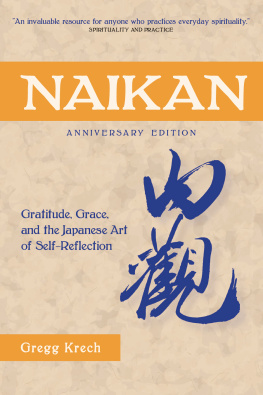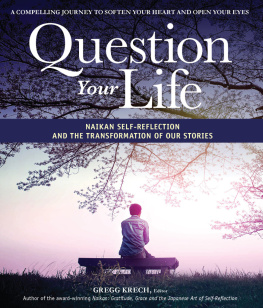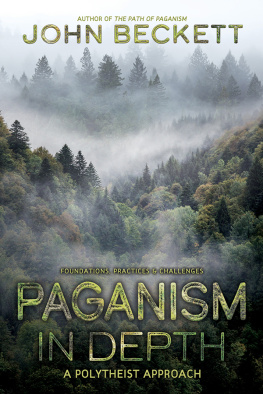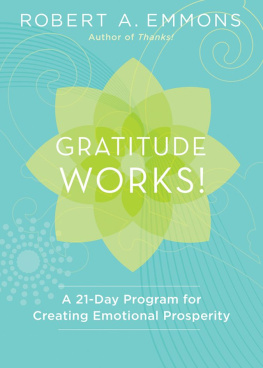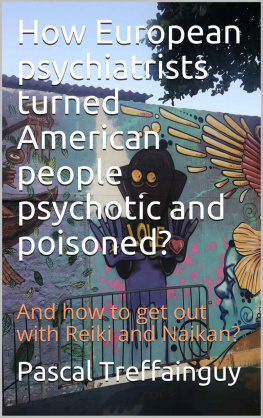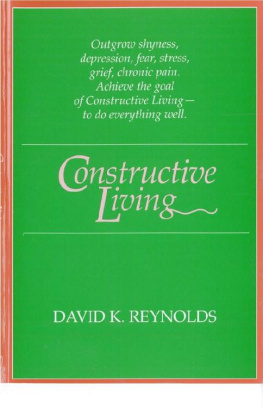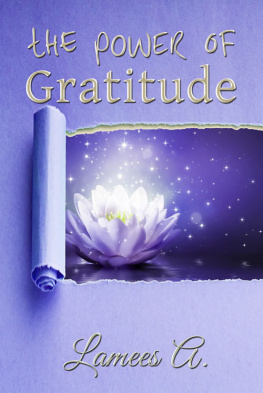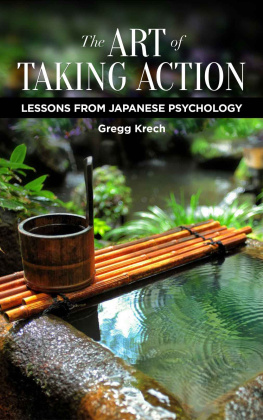This is the new Anniversary Edition ofNaikan: Gratitude, Grace, and the Japanese Art of Self-Reflection.It is being released twenty years after the book was originally published. It is revised, with new content, and reflects some of what Ive learned over the past twenty years about this profound approach to self-reflection from Japan.
PREFACE TO THE ANNIVERSARY EDITION
Where were you at the turn of the century? Do you remember much about that time in your life? Could you have predicted that this is where you would be so many years later? Has life met your expectations? Exceeded your expectations? Or are you disappointed in how your life has unfolded since then?
Often, when we find ourselves in a moment of reverie, we quickly snap out of it and come back to our present circumstances. There are financial decisions to be made, repairs that are waiting impatiently, kids and dogs who need attention. Life moves on. Were busy. The past is the past. Whats done is done.
Karma is the Sanskrit word for actionsomething that is done. If we say, this is my karma were really saying, this is my doing. When we do something, when we behave in a certain way, when we take actionit influences what will happen in the future. It influences the direction our lives will take. What you did at the turn of the century influenced the circumstances of your life today.
And what you did at the turn of the century has influenced more than just your life. Its influenced the world and people around you. Thats because our lives are interconnectedinterconnected with the people around us, but also with animals, with objects, with nature and the planet. In the words of John Donne,
No man is an island, entire unto itself; every man is a piece of the continent, a part of the main.
Karma and interconnectedness are two of the main pillars of Naikan self-reflection. We can think of our life as a book we have written. But the content of the book is not our ideas and feelings. It is based on our conduct in the world. The book of our life is a written record of how we have acted, of what we have done. It is a record of everything, from opening the door at the supermarket for a senior citizen to losing our temper and yelling at our partner.
It takes a bit of courage to read this bookthe personal record of our life. In its pages we come face to face with our karma. Its text makes for a less comfortable read than the edited version we usually carry with us. We prefer a storyline in which we are a hero to a villain. We prefer to see our success as earned rather than given. And, too often, we prefer the role of victim to that of perpetrator. How often do we avoid responsibility by putting the blame for our challenges or problems on others rather than owning it ourselves?
But regardless of how we have edited this book, the unedited draft remains anchored to our being and dramatically influences our path forward. How will it end?
Though the pages are numbered
I cant see where they lead
For the end is a mystery no-one can read.
Sting
What we are unaware of is the value, the freedom, that comes from embracing our life as it is and as it has been, with all its twists and turns, with all its gifts and betrayals. The moments in which we sacrificed ourselves for others and the moments in which we selfishly took the last piece of pie.
We invest a tremendous amount of energy in trying to present an image of ourselves to the world that isnt supported by how we have lived. We may think that if that image were abandoned our life would come crashing down. But the freeing up of all this energy opens us to a way of living that is lighter, lovelier, and more human.
There is a crack in everything, thats how the light gets in.
Leonard Cohen
We should be seeking the crack instead of trying to plaster it up. We should be developing an awareness of interdependence, rather than celebrating our independence. We should be examining our karma instead of turning away from it.
If you could step back and watch the workings of the world we live in, our interconnectedness would be obvious. But because most of us live in a relatively small bubble, we dont always see the impact of our karma on the world. We are often preoccupied by how what we do affects me. We each speculate on how the changing circumstances of the world will affect our own individual life. So when we attempt to understand how our behavior impacts others, our normal perspective is turned inside out. This is the very foundation of compassion and empathy. Fundamentally, our capacity for compassion and empathy requires an awareness of interconnectedness. And our karma.
Naikan self-reflection offers a profound opportunity to cultivate an awareness of interconnectedness. It offers the rare chance to investigate the karmic residue of our life. It gives us the means to change the way we see life and the world around us. And it offers a shift from a complaint-based life to one of authentic gratitude for what we have been given.
Perhaps, at some point in your life, you had an experience where death was on your doorstep. Ive had such an experience twice in my life. In its aftermath, we often find that we no longer see and connect with the world in the same way. Life is richer, more vibrant. We deeply appreciate the opportunity just to sip a cup of coffee or tea. We feel that our whole life is a gift, and we may feel overwhelmed by how much life offers us. We are deeply grateful just to be alive.
But, sadly, this sensation fades over time. We lose touch with the preciousness of life as our consciousness is drawn back into the common habit of taking life for granted while our attention is swallowed up by our problems and our dissatisfaction with our circumstances. We cannot schedule periodic brushes with death (nor would we want to), so we have no practical way back to a different way of seeing and understanding the preciousness of life.
Naikan self-reflection opens a doorway to such a path, though the mysteries of examining the underlying realities of life and human nature are never predictable. For the past thirty years I have assisted people in this journey through retreats or quiet reflection in their own living rooms. When we combine solitude, a questioning mind, and a sincere heart, we open a space for an awakening to something that goes beyond words and intellectual understanding. The silence of self-reflection is, in fact, a dialogue with a deeper truth.
When we give up on ourselves, we make space for something greater to enter our hearts home.
PREFACE TO THE ORIGINAL EDITION

